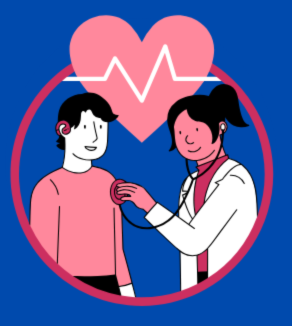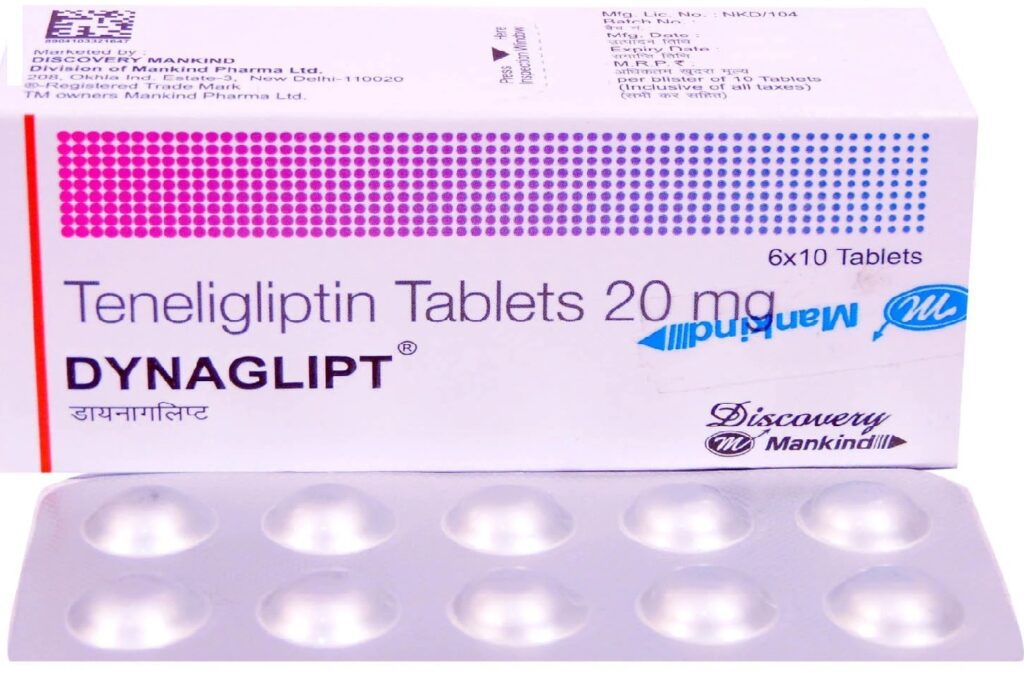Teneligliptin 20mg is a anti diabetic medication. For individuals with type 2 diabetes, teneligliptin tablets are recommended as a supplement to diet and exercise in order to enhance glycemic control (T2DM).
Proper name : Teneligliptin hydrobromide
Brand name : Dynaglipt, Teniva, Tenglyn
How Teneligliptin works :
The glucagon -like peptide-1 (GLP-1) is secreted from alimentary canal in response to meal that promotes insulin secretion from pancreas and regulates blood sugar post meal by controlling glucagon secretion. Teneligliptin has a hypoglycemic impact by preventing GLP-1 from being broken down by dipeptidyl peptidase-4 (DPP-4) activity inhibition, which raises the blood levels of GLP-1 in its active form.
Dosage :
Adults typically take 20 mg of teneligliptin orally once a day. If the dosage does not have the intended effect, it may be increased to 40 mg once daily while closely observing the progression of the patient.
Side effects of teneligliptin 20mg :
- Constipation
- Abdominal discomfort
- Nausea
- Flatulence
- Stomach ache
- Allergic dermatitis
- Allergic Rhinitis
- Fatigue
Other adverse effects may arise; this is not a complete list. For medical advice about side effects, contact your physician.
Precautions :
- When using teneligliptin tablet, the patient should be adequately informed about hypoglycemia and its coping mechanism. There may be an increased risk of hypoglycemia, especially if sulfonylurea or insulin formulation are also provided concurrently. Lowering the dosage of sulfonylureas or insulin formulations in conjunction with teneligliptin may help lower the risk of hypoglycemia produced on by these medications.
- Teneligliptin tablets should only be used in patients who have been diagnosed with type 2 diabetic mellitus (T2DM). Apart from type 2 diabetes, conditions including renal glycosuria and thyroid dysfunction that exhibit symptoms comparable to diabetes, like poor glucose tolerance or positive urine sugar, should also be taken into consideration.
- Teneligliptin tablets should only be taken into consideration as an alternative when adequate diet and exercise therapy have been used as the primary diabetic treatment.
- As teneligliptin tablets are being administered, monitor blood sugar levels frequently. If the medication’s effects are not satisfactory even after three months of use, change to treatment.
- When administering medication continuously, there are situations in which it is unnecessary, situations in which the dosage needs to be adjusted, and situations in which the patient’s intemperance and infections cause complications. For these reasons, it is important to monitor blood sugar levels, dietary intake, and the presence of infections in addition to choosing the right medication, choosing the right dosage, and deciding whether to continue taking the medication.
- Because this medication carries a risk of hypoglycemia, care should be used when administering it to patients who drive or work in high-risk environments.
How teneligliptin affects on body :
Absorption :
After a single dose of 20 mg of teneligliptin given post-meal to healthy people as opposed to empty stomach, plasma concentration decreases and Tmax increases from 1.1 to 2.6 hours; however, there is no difference in AUC. The plasma binding ratio is 77.6 to 82.2% .
Metabolism :
The unchanged material and its metabolites are observed in the blood plasma of healthy persons who consumed oral teneligliptin (20 mg).
Teneligliptin is mostly metabolized by CYP3A4 and flavin-containing monooxygenases (FMO1 and FMO3). Moreover, teneligliptin exhibits a mild inhibitory effect on FMO, CYP2D6, and CYP3A4.
Excretion :
Adults who receive a single dose of 20 or 40 mg of teneligliptin on an empty stomach excrete 21–22% of the medication as unchanged material in their urine, with a renal clearance of 37–39 ml/hr/kg
Missed Dose :
If you forget to take a dose, take it as soon as you remember. If, as happens sometimes, you forget until it’s time for your next dose, skip the missed one and resume your usual routine. It is not recommended to take two Teneligliptin dosages concurrently.
Contraindications :
Patients having a history of hypersensitivity to teneligliptin or to any excipients of the formulation.
Individuals with type 1 diabetes mellitus, diabetic coma or pre-coma, and severe ketosis.
Teneligliptin tablets should not be administered to patients who have serious infections, perioperative trauma, or severe exterior injuries because insulin injections are the preferred method of achieving glycemic control.
Warnings
Pregnancy :
Using teneligliptin tablets while pregnant may be dangerous. Studies on humans are rare, however research on animals has demonstrated negative effects on the growing fetus. Before writing a prescription for you, your doctor will consider the advantages and any possible risks. Kindly speak with your physician.
Lactation :
Breast feeding must be discontinued during administration of teneligliptin in lacting women.
Driving :
If your blood sugar level is too high or too low, it could damage your ability to drive. If you experience these symptoms, don’t drive.
Alcohol :
Alcohol use while using teneligliptin Tablets is not allowed.
FAQ FOR TENELIGLIPTIN :
Is Teneligliptin safe to be taken for a long term?
Yes, using teneligliptin for an extended period of time is safe. There are no side effects from long-term use, which can last for months, years, or even a lifetime. Take Teneligliptin for as long as prescribed by your physician. Recall that teneligliptin does not treat diabetes; rather, it merely helps you maintain blood sugar control.
Is Teneligliptin bad for your kidneys?
If your kidney function is normal, then no, teneligliptin is not harmful to your kidneys. It’s important to let your doctor know if you currently have renal issues or have ever had any. It could be necessary to adjust your dosage if you have renal issues.
what is teneligliptin used for?
Teneligliptin is anti-diabetic medication. It is used along with diet and exercise to improve blood sugar control in adults with type 2 diabetes

